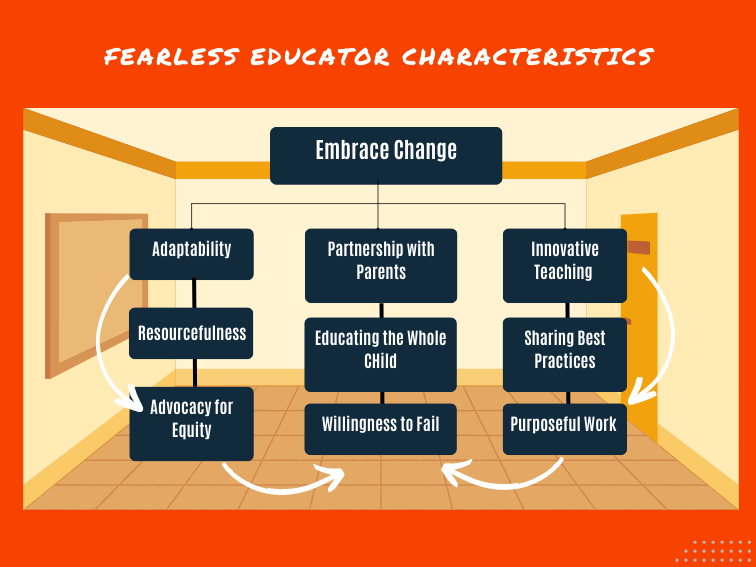10 Strategies For Teaching For Change
The Priorities Of Teaching For Change contributed by Olivia Odileke As an educator, you hold a position of immense responsibility in shaping the future of our society. To truly make a difference, becoming ‘fearless’–a teacher who isn’t afraid to push boundaries and take risks–may be one path forward. In, ‘How a Good Teacher Becomes Great,’…

The Priorities Of Teaching For Change
contributed by Olivia Odileke
As an educator, you hold a position of immense responsibility in shaping the future of our society.
To truly make a difference, becoming ‘fearless’–a teacher who isn’t afraid to push boundaries and take risks–may be one path forward. In, ‘How a Good Teacher Becomes Great,’ we learned about some of the qualities that make a great teacher.
However, being ‘great’ may not be enough in the modern classroom. In the context of teaching, a great teacher (see 12 Rules Of Great Teachinng) may possess exceptional skills in areas such as lesson planning, classroom management, and student engagement. However, a fearless teacher takes these skills a step further by being willing to try new teaching methods, take on challenging students, and adapt to changing educational environments to achieve a kind of teaching that’s effective and sustainable.
See also Great Teachers Don’t Always Do What They’re Told
We need educators who are unafraid to challenge the status quo, who are willing to try new things, and who are passionate about providing the best education possible. In this article, we will discuss ten essential characteristics of a teacher for change and explain why these qualities are vital to success in the classroom.
In light of increasing pressure and seemingly reduced time and resources, being a fearless and teaching for change may seem like a monumental challenge but may also be a key strategy in thriving in the context of modern K-12 post-secondary education.
1. Embracing Change
A teacher for change understands that change is inevitable and necessary. They recognize that the needs of their students are constantly evolving and are willing to adapt their teaching methods to meet those needs. They are not afraid to challenge traditional approaches and are always looking for new and innovative ways to engage their students.
2. Adaptability
A teacher for change is willing to adapt to new instructional practices, technologies, and pedagogies. They understand that what worked in the past may not be effective today and are always seeking out new ways to improve their teaching.
More importantly, they understand that good teaching needs to be sustainable–joyful and creative or, if nothing else, something they enjoy doing on a daily basis.
See also How To Make Teaching More Sustainable
3. Resourcefulness
A teacher for change doesn’t focus on what resources they don’t have, but on what they do have. They are creative in finding solutions to problems and are willing to make the most of the resources available to them.
4. Partnership with Parents
A teacher for change understands the importance of partnering with parents from all backgrounds. They recognize that parents are a child’s first teachers and engage them in their child’s education as much as possible. They work to build positive relationships with parents and involve them in the educational process.
See also Strategies For Dealing With A Difficult Parent
5. Educating the Whole Child
A teacher for change seeks to educate the whole child, not just prepare them for a test. They understand that education is not just about academics, but also about social-emotional development, physical health, and creativity. They work to develop well-rounded individuals who are prepared for success in all areas of life.
6. Innovative Teaching
See also Disruptive Teaching
A teacher for change seeks innovative ways to make content real and relevant. They understand that students learn best when they are engaged and invested in the material. They incorporate technology, hands-on activities, and real-world experiences to bring the material to life.
7. Advocacy for Equity
A teacher for change is willing to ask tough questions of instructional leaders to ensure equity for students and teachers. They recognize that inequities exist in our education system and are committed to working to eliminate them. They advocate for all students to have access to high-quality education and for teachers to have the support and resources they need to be successful.
8. Sharing Best Practices
A teacher for change loves sharing best practices and they share student success with peers so everyone grows. They recognize that teaching is a collaborative process and are always looking for ways to improve their craft. They share their successes and challenges with colleagues, attend professional development opportunities, and participate in mentoring programs to support the growth of their peers.
9. Purposeful Work
A teacher for change knows why they teach and they have purpose in the work they do every day. They are passionate about their profession and believe that they can make a difference in the lives of their students. They are committed to their own personal and professional growth and are always looking for ways to improve their practice.
See also The Definition Of Good Work
10. Willingness to Fail
A teacher for change is willing to make mistakes and fail as they try new approaches. They understand that failure is a natural part of the learning process and are not afraid to take risks in their teaching. They learn from their failures and use those experiences to improve their practice.
Being a teacher for change takes courage, passion, and a commitment to excellence. By embracing change, seeking out new opportunities, and being willing to take risks, you can make a profound impact on the lives of your students. So be fearless in your approach to teaching, and inspire the next generation of learners to be fearless, too.
Olivia Odileke is a Chief Engagement Officer and visionary leader at Kampus Insights Inc, who strives to inspire a fearless culture among educators. With her extensive experience as a Title 1 Teacher, Math Teacher, Science Teacher, Math Coach, and Instructional Coach, Olivia is dedicated to helping teachers create amazing lessons and empower students to reach their full potential. She holds a Bachelor’s degree in Industrial Engineering and a Master of Education in Instructional Technology.
